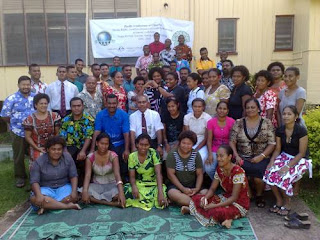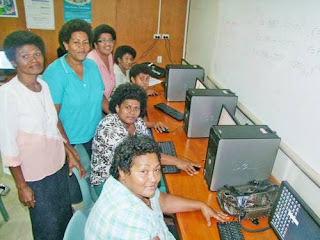
from w
The journalists from Labasa are energetic and contribute daily to the Fiji media which is a bonus for readers of babasiga blog where we can post on interesting pieces of news such as this one from the
Fiji Times. And of course Rev Bhagwan is a prolific writer in the media. Way to go.
Human dignity and justicePadre James Baghwan
Wednesday, December 08, 2010
Bula si'a from Labasa!
I am in my motherland to lead a series of Bible Studies at a workshop for churches on Human Rights, Good Governance and Leadership, organised by the Pacific Conference of Churches.
It is good a privilege to have this opportunity to participate in this workshop and share some biblical and theological reflections on human rights. It is also a rare opportunity to visit my mother's hometown, (the L.A. of Fiji to some) and meet up with family and close friends.
Close to sixty young people, lay workers and clergy from Labasa and around Vanua Levu have gathered at St. Mary's Hostel, in Labasa to explore human rights in the context of the church and cultural traditions, using local examples as case studies to enhance learning.
According to Mr. Raju Fong who is responsible for the PCC Human Rights programme, the workshop will also focus on the UN Declaration of Human Rights and other important conventions on human rights.
"Our experience so far is that people understand what human rights, and our goal is to contextualise human rights for their culture and faith," said Mr. Fong.
This year workshops were held in Suva, Samoa, Kiribati, Maohi Nui (Tahiti), Solomon Islands and Vanuatu. There are plans for a workshop on climate change and Human Rights in Labasa in 2012.
Mr. Fong added, "The participants come from churches, they shy away from secular discussions on human rights, but when you link it to their faith, through bible studies and discussions on Christian understandings of justice, mercy, compassion and other core Christian principles, then they begin to understand that Human Rights is not a foreign concept but something that is in fact close to their hearts."
The objectives of the Human Rights Programme of the Pacific Conference of Churches are:
· To deepen understanding on human dignity and human rights.
· To create awareness of Christian responsibilities towards the protection and promotion of human rights.
· To increase the scope for social action on human rights issues by churches and their members.
On the workshop began on Monday with a devotion led by Father J.J. Ryan. The Citizens' Constitutional Forum made a presentation on the Universal Declaration of Human Rights, and I shared on the biblical and theological foundations of Human Rights.
Yesterday, Aisake Casimira, Programme Manager for PCC shared with participants on the key concepts of consent, consultation and participation in the area of governance and leadership.
Sessions will also be held on Violence against Women, the Rights of Children and the role of the churches on human rights, good governance and leadership issues.
The understanding of human rights as a Christian responsibility lies in the understanding from the human rights perspective that every human being is worthy of respect and has the right to live in dignity.
Our first bible study focused on humankind being created in the image of God, (Imago Dei) based on the text from Genesis a central book in the Judeo-Christian-Muslim scriptures.
Genesis 1:27 reads as: "So God created man in His own image; in the image of God He created him; male and female He created them."
This passage reminds us that every man and woman is made in the image and likeness of God.
The term Imago Dei denotes image and likeness of God.
The scriptures teach us that in the creation of humankind God stated, "Let us make man in our image, after our likeness." God made "man" in his image and likeness, because of this there is a certain dignity or worth of the human person.
For Christians, our God, is a creator, a "Father" to us all. As a result, all humans are brothers and sisters. Humans are unique and related to others in a common origin, ancestry, common physiology and psychology. This basically means we have the same working parts and experience the same range of emotions.
One of the central faith statements for Christians is found in the Gospel of John chapter 3 verse 16: "For God so loved the world that he gave his one and only Son, that whoever believes in him shall not perish but have eternal life. (NIV)" Christians believe that the Christian God is the God of every race and every human being. Jesus therefore died on the cross for the whole world.
All forms of racism, prejudice, and discrimination are, for that reason, an insult to the work of Christ on the cross. Jesus commands us to love one another as He loves us (John 13:34). If God is impartial and loves us with impartiality, then we need to love others with that same high standard.
Jesus teaches in Matthew 25 that whatever we do to the least of His brothers, we do to Him. If we treat a person with contempt, we are mistreating a person created in God's image; we are hurting somebody whom God loves and for whom Jesus died. From our love of God and love of our neighbour, flow the respect, compassion and thirst for justice, that are expressed in the Universal Declaration of Human Rights.
On Friday, 10th December, the world celebrates International Human Rights, there will be speeches and rallies and concerts and events all over the world to mark this important day.
In Labasa the workshop participants will join in an ecumenical church service to commemorate this day.
The prophet Isaiah called people to share your food with the hungry and to provide the poor wanderer with shelter--when you see the naked, to clothe them, and not to turn away from your own flesh and blood."(Isaiah 58:7).
If you live in Labasa and what you have read strikes a chord in your soul, you are welcome to attend the Human Rights Day Ecumenical Church service at 10am at St. Thomas Anglican Church on Nasekula Road, Labasa's main street.
May the rest of your week be blessed with Mishpat (justice); Hesed (steadfast love); and Shalom (peace).
nReverend J.S. Bhagwan is a member of the Faculty at Davuilevu Theological College and the Associate Minister of Dudley Methodist Circuit in Suva.
This article is the sole opinion of Rev. J.S. Bhagwan and not of this newspaper or any organisation that he is affiliated with.
Email: padrejames@gmail.com


















